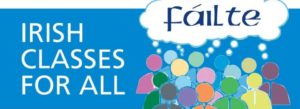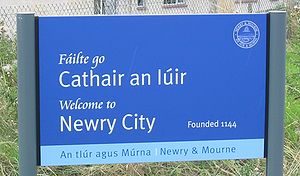
I have just confirmed, that when we’re in Belfast we’re going to meet with Linda Ervine, who teaches the Gaelic/Irish language to Loyalists in the city. Linda will tell us about her work and give us a language lesson—get ready to learn a bit of Irish!
Why is her work so remarkable? The Irish language has long been associated with Republicanism, the brand of politics that advocates a unified Ireland separate from the UK. Most of the people who hold these views are Catholic. Loyalists, who are mostly protestant, fiercely believe that the six counties of Northern Ireland should remain a part of the UK, and in fact most of them see themselves as British, not Irish. They have historically objected to the Irish  language movement and to anything that carries even a hint of Republicanism. Yet many Loyalists had ancestors and even parents who grew up speaking Irish. Place names throughout the island are heavily Irish, and the culture their ancestors knew was Irish in many ways
language movement and to anything that carries even a hint of Republicanism. Yet many Loyalists had ancestors and even parents who grew up speaking Irish. Place names throughout the island are heavily Irish, and the culture their ancestors knew was Irish in many ways
The stalemate in forming a provincial government has a disagreement over the language issue at its core. Republicans (Sinn Fein) want a language act passed to protect Irish and make it a state language, while Loyalists see such a move as giving “everything” to the other side. They fear their culture will be erased if the language associated with Republicanism achieves special status.

Linda Ervine, who comes from a Unionist family (milder form of Loyalism), didn’t grow up in an Irish speaking household, but when she became familiar with the language, she fell in love with it and started to learn. She wants to help depoliticize the language and assure its survival by teaching it. Her special mission of reconciliation and peace-building is to teach the language to the Loyalist community. Her students are people who have been told all their lives to stay away from anything “Irish,” especially the Irish language, but for one reason or another, they have desire to learn it. Some of them even sneak out to classes, not telling their families where they are going. Linda believes that language learning can play a role in bringing together Northern Ireland’s two communities.

Where government-sponsored programs have not always made a difference, creative community-based efforts often have more success. Linda is a lovely person who has found a way to reach out to others through language and through the very satisfying medium of lifelong learning. Given the still very raw sensitivities of the Republican and Loyalist communities, her work takes patience and courage. The Agnes Scott students who met her last year found her work to be fascinating; they proudly spoke the Irish she taught them for the rest of the trip.
I’m very interested in the ways in which individuals, grass-roots organizations, and cultural entities are seeking common ground with “the other side” in Northern Ireland. Linda has a great story to tell and I’m very excited that she was able to make the time for us.
To learn more about Linda Ervine and her work, take a look a this lecture she gave last year (click on the image).
Here are a couple of newspaper articles that tell about Linda and her work.
Linda Ervine: I realised Irish belonged to me–a Protestant–and I fell in love with it.
Linda Ervine lifts lid on teen pregnancy and being kicked out of school at fifteen

Great! This sounds wonderful. Thanks, Christine!
I watched the video and read the article. Fascinating that language has been such a tool in the conflict. Looking forward to this visit.